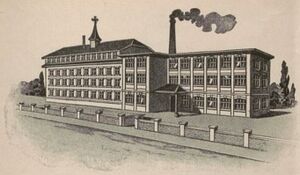Reconvilier Watch Company: Difference between revisions
No edit summary |
m Sfoskett moved page Reconvilier Watch Co to Reconvilier Watch Company |
(No difference)
| |
Revision as of 16:29, 23 June 2024

The Reconvilier Watch Company was founded in 1853 by Dr. Tièche in Reconvilier.
The factory rose to prominence and at the beginning of 1870 was taken over by Kuhn and Tièche. They expanded production to include the manufacturing of ebauches in addition to cases and complete watches. In 1883 the company received a diploma at the Swiss National Exhibition in Zurich. In 1885 it was awarded a bronze medal at the Universal Exhibition in Antwerp for the excellence of its products.
Société Horlogère Reconvilier
In 1902 the business was transformed into a Société Anonyme and the additional funding that came was used to expand manufacturing. This is the date referenced throughout the 20th century as the founding date of the firm, despite the fact that it was already 50 years old at the time.
Specializing at first only on higher-quality Roskopf watches, the factory soon began to manufacture anchor pocket watches and wristwatches. The Roskopf System watches produced there included an elegant model only 22 twelfths high, and Reconvilier also manufactured the exact watch envisioned by Louis Roskopf.

In the 1930s the company added production of 8-day clocks and other specialties such as automatic switches for radios, illuminated advertisements, and more. The factory was lead up to this point by Georges Ruedin, who died in 1935. By this point it employed nearly two hundred workers, of which more than a third had been with the firm for more than 25 years.
In 1942 the Reconvilier Watch Co. celebrated its 50th anniversary. Contemporary advertisements show a range of watches in various popular styles with the words "Qualite" and "Precision". The company used the brands Reconvilier, Hercules, and Louis Roskopf on various products.
André Ruedin (1902-1947) administered the company during this time but died suddenly in 1947 of a heart attack. He had worked at the firm since February 1926 and took over following the death of his father, Georges Ruedin in 1935.